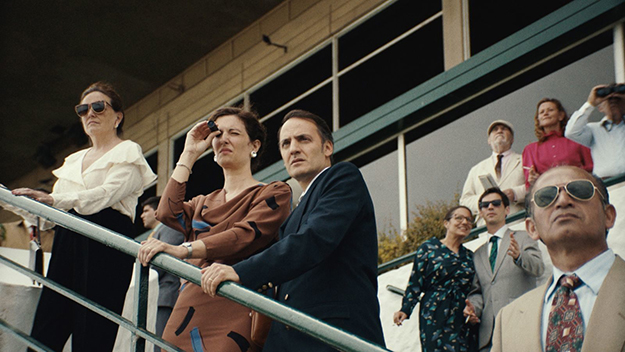Review: Azor
This article appeared in the September 9 edition of The Film Comment Letter, our free weekly newsletter featuring original film criticism and writing. Sign up for the Letter here.

Azor (Andreas Fontana, 2021)
Money talks in Azor, but it doesn’t raise its voice. With its deceptively spare, functional mise-en-scene and tamped-down performances, Andreas Fontana’s Dirty War thriller is a superlatively muted debut. It’s explained late in the film that the title translates—loosely, in banking slang—to “be quiet,” which in this context is less an imperative than a tactical strategy. It surely behooves Genevan banker Yvan (Fabrizio Rongione) to occasionally hold his tongue while dealing with wealthy clients addicted to the sounds of their own voices. But “Azor” also signifies in an Old Testament context, connoting a kind of helper figure, and the question of what exactly Yvan’s tactful, servile self-effacement is in service of—who it aids, and who it abets—gives the movie its shape and subtext.
By now, Argentinian films tackling the country’s late 20th-century legacy of state violence comprise their own healthy, globally saleable subgenre. In 2018, Benjamín Naishtat’s excellent Rojo dissected the country’s pre-coup psychology while nodding stylishly to American neo-noir tropes (and who can forget the Oscar-winning ridiculousness of 2009’s The Secret in Their Eyes) There’s less formal and structural playfulness in Azor than Rojo, and less plot, too: Yvan is in Buenos Aires to check in on his bank’s wealthy clients and offer assurances in a moment of political instability that their money is safe. The film creeps along with an inscrutable sense of insularity, as if its characters—not only Yvan but also his impassive, fashionable wife Ines (Stéphanie Cléau), who’s accompanying him on his rounds, and the well-to-do entrepreneurs and landowners in his Rolodex—were speaking their own private dialect. And of course, they are: not only the argot of big business but also the clandestine code of those who suspect they’re being surveilled by a government whose inner circle would prefer to not see large sums of money being moved to Europe. Or at least, not without taking a cut.
In interviews, the Swiss-born Fontana has explained that he drew on his own grandfather’s experiences in Argentina’s financial sector to help fill in Azor’s professional milieu. The paradoxical effect of all that scrupulous authenticity is a feeling of ambient alienation. There’s no simple entry point into the material, and the exposition about Yvan’s firm—particularly the whereabouts of his colleague and senior partner “Mr. Keys,” an enigmatic raconteur with a long-established rapport with Argentina’s elite and a reputation for “depravity”—is parceled out so judiciously that even attentive viewers might occasionally lose their bearings. (I did, anyway.)
It’s in the shrewd juxtaposition of all this nebulous networking—of deals alluded to and closed; appointments made and kept; anecdotes of executive-class nostalgia offered and withheld—with the present danger posed by a power-hungry military junta, that Fontana cultivates and nails a tone of placid paranoia. The film’s uneventfulness gradually metastasizes into dread, and the bad vibes linger through every well-heeled, brightly lit encounter. In the closest thing to a traditional genre-movie sequence, Yvan sneaks into Keys’s abandoned hotel room under cover of night and discovers… nothing of interest. And yet because Azor is so attuned to the anxiety of absence and forced disappearance, the lack of visible evidence of anything—a person; a crime; an explanation—serves as its own insidious form of confirmation. In the end, Yvan decides it’s probably better not to know, and certainly not to say anything more about it. Among its wide range of period-specific yet eerily relatable sensations, Azor most potently evokes the comfortable numbness of keeping one’s mouth shut.
Adam Nayman is a critic for The Ringer and a contributing editor to Cinema Scope. He is the author of Paul Thomas Anderson: Masterworks and The Coen Brothers: This Book Really Ties the Films Together for Abrams, and Showgirls: It Doesn’t Suck for ECW Press.







